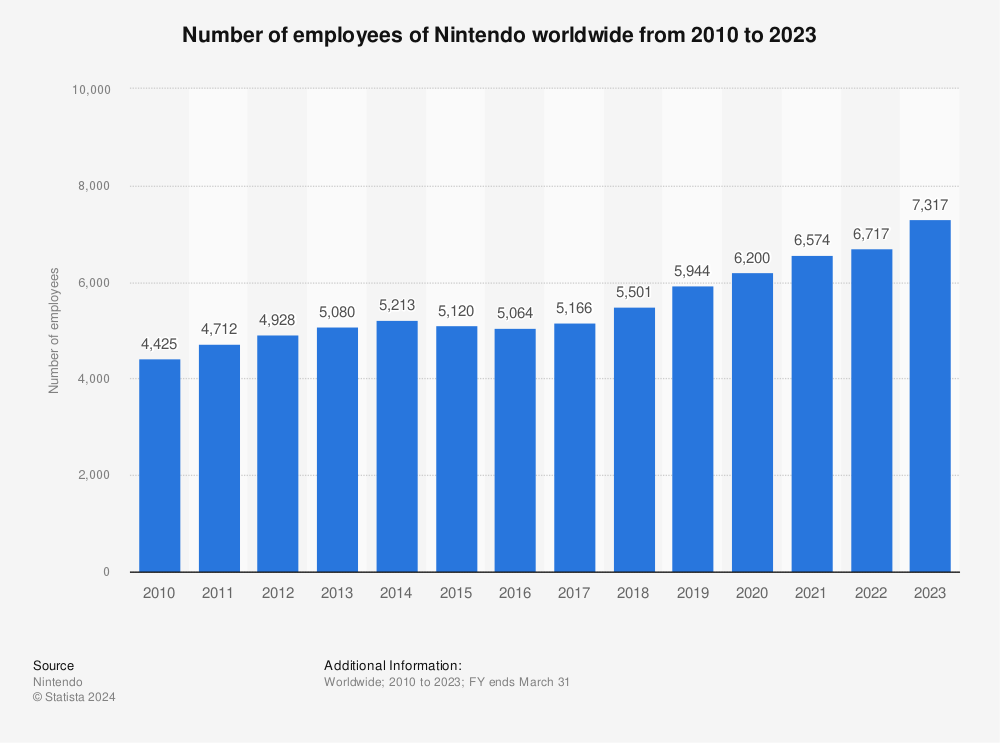I've always been baffled by the overall employee count that Nintendo has maintained every year. Not because they are particularly a small company, but because they are extremely successful and their numbers don't ever seem to grow in accordance to their success. What exactly did NCL invest in with their massive hardware and software sales during the Wii and NDS era? We saw SCE (SIE) grow their resources exponentially during the PS1 and PS2/PSP era, but it just doesn't seem like the same can be said about Nintendo.
Doing a quick revenue / employee account from other successful companies with a comparable structure of publishing and development looks like this:
(year revenue versus employee count)
3,376,345,151.41 / 10,670 UBISOFT (based off 2016 data)
4,515,000,000.00 / 8,400 ELECTRONIC ARTS (based off 2015 data)
4,688,194,761.09 / 5,064 NINTENDO (based off 2016 data)
1,560,380,329.00 / 3,864 SQUARE-ENIX (based off 2015 data)
1,100,000,000.00 / 4,700 BLIZZARD ENTERTAINMENT (based off 2015 data)
0,240,701,909.00 / 2,601 CAPCOM (based off 2014 data)
I couldn't find Sony Interactive Entertainment data to do an even fairer comparison. But as it stands, it just seems like the company never grew fast enough. It definitely never embraced the global expansion that Sony and Ubisoft have mastered.
Edit - Additional NCL Info
2,200 Non-Consolidated Employees (Nintendo)
5,064 Consolidated Employees (NCL, NOA, NOE, NHK, NOK, NST, NTD, NNSD, NERD, NDCUBE, iQUE, Retro Studios, Monolith Soft, NES Merchandising, etc.)
Affiliate Employees not counted (The Pokemon Company, Genius Sonority, PUX, SRD, HAL, Intelligent Systems, Creatures Inc.) Maybe 400 people at best.
Doing a quick revenue / employee account from other successful companies with a comparable structure of publishing and development looks like this:
(year revenue versus employee count)
3,376,345,151.41 / 10,670 UBISOFT (based off 2016 data)
4,515,000,000.00 / 8,400 ELECTRONIC ARTS (based off 2015 data)
4,688,194,761.09 / 5,064 NINTENDO (based off 2016 data)
1,560,380,329.00 / 3,864 SQUARE-ENIX (based off 2015 data)
1,100,000,000.00 / 4,700 BLIZZARD ENTERTAINMENT (based off 2015 data)
0,240,701,909.00 / 2,601 CAPCOM (based off 2014 data)
I couldn't find Sony Interactive Entertainment data to do an even fairer comparison. But as it stands, it just seems like the company never grew fast enough. It definitely never embraced the global expansion that Sony and Ubisoft have mastered.
Edit - Additional NCL Info
2,200 Non-Consolidated Employees (Nintendo)
5,064 Consolidated Employees (NCL, NOA, NOE, NHK, NOK, NST, NTD, NNSD, NERD, NDCUBE, iQUE, Retro Studios, Monolith Soft, NES Merchandising, etc.)
Affiliate Employees not counted (The Pokemon Company, Genius Sonority, PUX, SRD, HAL, Intelligent Systems, Creatures Inc.) Maybe 400 people at best.

